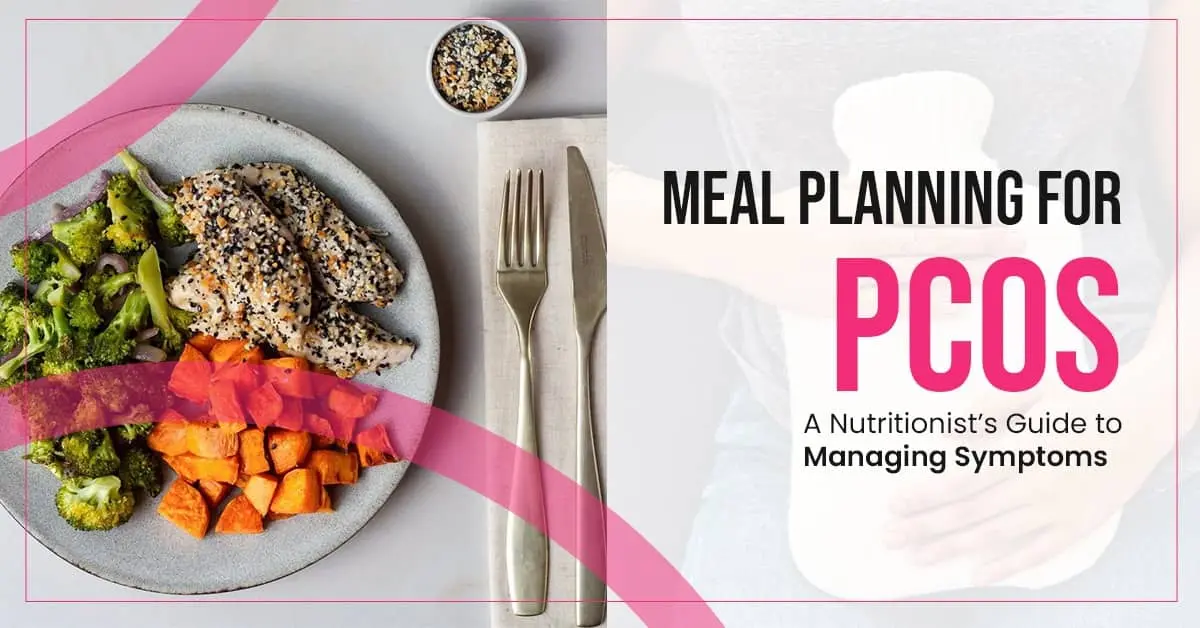Introduction to PCOS and the Importance of Meal Planning
Polycystic Ovary Syndrome (PCOS) affects many women and can lead to various symptoms like irregular periods, weight gain and insulin resistance. Effective meal planning for PCOS is crucial for managing these symptoms and promoting overall Health. By focusing on a PCOS Diet plan that includes PCOS-friendly foods, you can help manage insulin levels, reduce inflammation and support hormone balance.
Key Nutrients and Foods for a PCOS-Friendly Diet
When planning meals for PCOS, it’s essential to focus on specific nutrients and foods that support overall Health and manage symptoms:
- Fiber: High-fiber foods can help regulate blood sugar levels and improve digestion. Incorporate foods like whole wheat roti, chickpeas and vegetable curries.
- Lean Proteins: Proteins are important for maintaining muscle mass and controlling hunger. Include chicken tikka, dal, and paneer in your meals.
- Healthy Fats: Sources of omega-3 fatty acids and monounsaturated fats help reduce inflammation. Use ghee, flaxseeds, and nuts in your cooking.
- Low-Glycemic Carbohydrates: These help manage insulin levels. Opt for brown rice, quinoa, and whole grain bread.
Balancing Carbohydrates in Your PCOS Diet
Carbohydrates can impact insulin levels, which is a key concern in PCOS. A low-carb PCOS Diet plan can help manage these levels:
- Complex Carbohydrates: Choose whole grains and legumes over refined carbs. Include dishes like chole (chickpea curry) and brown rice pulao.
- Controlled Portions: Be mindful of portion sizes to avoid blood sugar spikes. Balance your meals with vegetable curry, dal, and roti.
Anti-Inflammatory Foods and Their Benefits
Inflammation is often associated with PCOS, and consuming Anti-inflammatory foods can help manage symptoms:
- Turmeric: Known for its Anti-inflammatory properties, turmeric can be added to dal or vegetable curries.
- Ginger: Ginger helps with inflammation and digestion. Use it in ginger tea or add it to stir-fried vegetables.
- Leafy Greens: Spinach, fenugreek leaves and mustard greens are great choices. Include palak paneer or methi thepla in your meals.
Meal Prep Tips for PCOS
Effective PCOS meal prep can simplify maintaining a balanced Diet:
- Plan Ahead: Prepare a weekly meal plan that includes a variety of PCOS-friendly snacks and meals. This can help you stick to dietary goals and avoid unhealthy choices.
- Snack Wisely: Keep healthy snacks like roasted chana (chickpeas), fruit, and vegetable sticks with hummus readily available.
Managing Cravings and Emotional Eating
Cravings and emotional eating can be challenging aspects of managing PCOS. Here’s how to address them:
- Healthy Substitutes: Opt for healthier alternatives to comfort foods. Try yogurt with a sprinkle of nuts instead of high-sugar desserts.
- Mindful Eating: Pay attention to hunger cues and eat slowly. This helps in recognizing true hunger versus emotional eating.
- Balanced Meals: Ensure each meal includes a mix of proteins, healthy fats, and low-glycemic carbs to keep you full and satisfied.
Sample 7-Day Meal Plan for PCOS
Here’s a sample PCOS diet plan featuring Indian food options:
Day 1:
- Breakfast: Oats Upma with mixed vegetables
- Lunch: Chole (chickpea curry) with a small portion of brown rice
- Dinner: Grilled Lean cut of chicken with a side of sauteed spinach
Day 2:
- Breakfast: Greek Yogurt with chia seeds and a small amount of fresh fruit
- Lunch: Palak Paneer (spinach and cottage cheese) with whole wheat roti
- Dinner: Bajra roti with sabzi and salad.
Day 3:
- Breakfast: Smoothie with spinach, almond milk, and berries
- Lunch: Vegetable Stir-Fry with tofu and quinoa
- Dinner: Stuffed Bell Peppers with a mixture of vegetables and brown rice
Day 4:
- Breakfast: Besan Chilla (chickpea flour pancakes) with mint chutney
- Lunch: Lentil Soup with a side of mixed vegetable salad
- Dinner: Grilled Fish with a side of roasted cauliflower
Day 5:
- Breakfast: Vegetable Poha (flattened rice with veggies)
- Lunch: Rajma (kidney beans) with whole wheat roti
- Dinner: Chicken Curry with a side of sautéed green beans
Day 6:
- Breakfast: Quinoa Porridge with nuts and berries
- Lunch: Cabbage Sabzi with a side of whole wheat roti
- Dinner: Stuffed Zucchini with a side of moong dal
Day 7:
- Breakfast: Chia Seed Pudding with a small amount of honey and fresh fruit
- Lunch: Mixed Bean Salad with cucumbers, tomatoes, and a lemon yoghurt dressing
- Dinner: Paneer Tikka with a side of mixed vegetable stir-fry
Conclusion
Effective meal planning for PCOS can significantly impact your ability to manage symptoms and maintain overall Health. By focusing on PCOS-friendly foods, balancing carbohydrates, and incorporating Anti-inflammatory ingredients, you can improve your quality of life and support your journey towards better health. Embrace these meal prep tips and sample meal plans to stay on track with your dietary goals. Always consult with a nutritionist or healthcare provider for personalized advice tailored to your specific needs.


